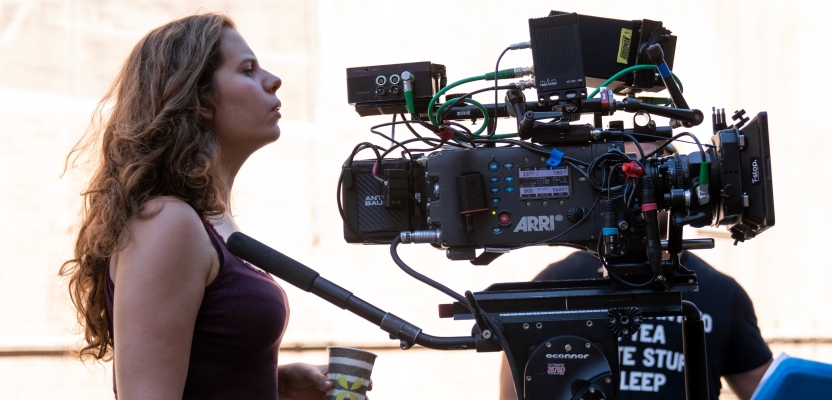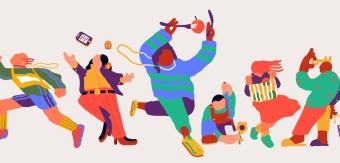How did you get into the industry?
A few years ago, I booked a one-way ticket to Los Angeles to follow a one year directing certificate. I started working as a production assistant on sets while I was there. I then started producing my own short films which helped me understand the nuts and bolts of the production aspect of a movie.
I learned most of what I know by doing and observing. I finally got into freelance work and have been working on several projects covering different creative aspects like producing, screenwriting and directing ever since.
Where are you based now and who do you work for?
I am located in the South of France, and I mainly work for clients based in Europe or initiate my own projects.
If you weren’t in your current industry, what would you be doing?
That’s the question everyone working in an industry offering so few career opportunities ask themselves every morning.
Most of the people I’ve met that worked in the film industry are no longer pursuing a career in that field. The path to making your own movies is very long and it is easy to give up.
For my part, when reasonable people advise me to consider a career where there’s less risk of having your work recognized after your death, I reply that’s like asking a pregnant woman not to give birth and to indulge in less futile activities.
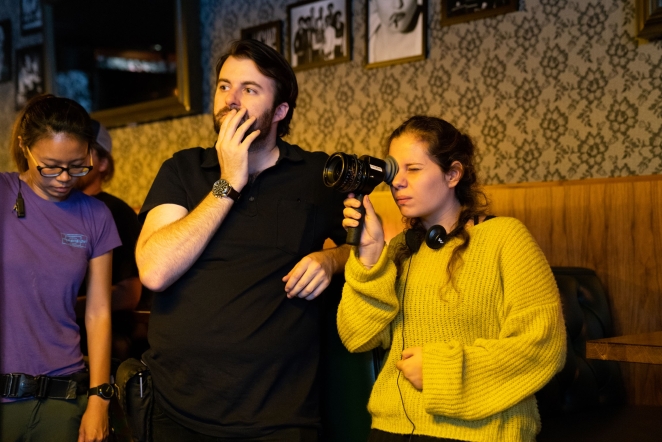
In my moments of discouragement, I’ve considered taking up activities more likely to pay my rent and considering my artistic activities as a mere hobby but could never put it aside.
The People’s Choice award I’ve just won in your competition reinforces my belief that my artistic expression is more than that, and that I can bring a slice of dream and artistic emotion to an audience.
I am eager for more opportunities to explore my creative vision.
Can you explain your creative process? What makes it unique?
Patience is crucial. I admit frustration can occur when I’m developing ideas but it's sometimes necessary to stray briefly from the script before returning to it.
Music plays an essential part in my writing process. For each project, I create a personalized playlist that matches the mood I’m aiming for. I start by listening to a specific song, allowing its emotion to inspire a scene.
Another effective approach for me is what I call “visualisation in movement”. I walk around my office, mentally evoking a fictitious street, for instance. I then allow my imagination to run wild. Eventually, if I’m lucky and my muse happens to be nearby the characters emerge, as if I were rediscovering a dusty old book in an attic, containing familiar stories.
Unfortunately, what I can only describe as a state of trance alas can’t be triggered by a simple wish. All too often, what may seem like a brilliant idea at 2 a.m. turns out to be less brilliant in the morning.
Training your eye is an absolute necessity to develop your creative vision.
Everyone nowadays carries a camera in their pocket. Even if your phone doesn’t provide high quality photographs, you can train your eye and find inspiration by taking pictures of your surroundings.
Most importantly, I submit my work to a competent person who will be sincere with me. I would qualify this as an indispensable step before you unleash your brainchild onto the unsuspecting world.
How would you describe your style?
Others have often described me as a director with a penchant for poetry and nostalgia.
However, I’m rather hesitant when it comes to defining my own style. I prefer to explore creativity and let people do their own thinking about my artistic decisions.
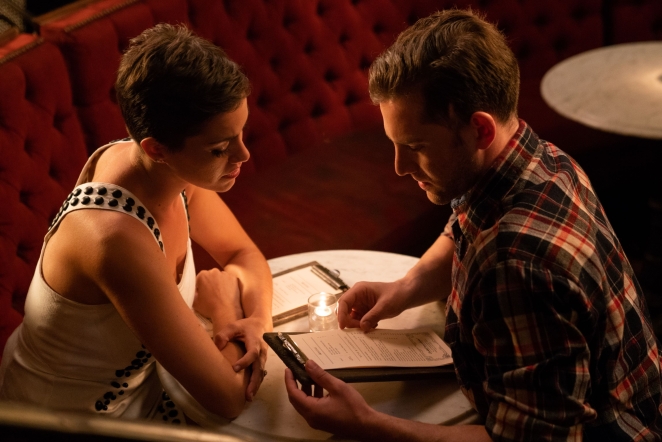
I’m inclined to reveal beauty in the smallest detail and actively seek spontaneity, whether in cinematography or in the performances of my actors. I like to give my actors a framework in the script, while leaving them room for improvisation.
What is most important to me is the genuine connection they make with each other, because I believe that when this connection is forged, everything else falls into place.
Which individuals do you gain inspiration from? Do you have any heroes in the industry?
I wouldn’t claim to have heroes within the industry, but there are certainly individuals and films that I hold in high regard.
“The Tree of Life” holds a special place in my heart. The way the camera is used to unveil a fresh perspective on everyday reality is truly captivating. Terrence Malick’s artistic style, not only in this film but also in his earlier masterpiece “Days of Heaven” offers invaluable lessons to us as filmmakers.
Cary Joji Fukunaga is another director I’ve closely followed ever since his debut feature film, “Sin Nombre”. His characters often grapple with overwhelming environments, yet he consistently infuses a sense of hope, striving to salvage at least one of them.
What sets him apart is his ability to wear multiple hats, occasionally stepping into the role of director of photography. His films feature majestic tracking shots and intricate framing, displaying his status as a genuine and multifaceted artist right from the beginning of his career.
Jacques Audiard is yet another director I deeply admire. He frequently delves into stories featuring characters who are not destined to be heroes; they are ordinary individuals struggling with their own issues.
However, their lives take unexpected turns, revealing hidden facets of their personalities. “Deephan” and “Un Prophète” are both splendid examples of Audiard’s work, displaying intricate and continually evolving character arcs.
I must confess, I also have a soft spot for science fiction, particularly when it subtly intertwines with our present-day world and the associated societal challenges. Films like “Eternal Sunshine of the Spotless Mind”, “Vanilla Sky” and “Children of Men” are among my all-time favourites.
Finally, I think Stanley Kubrick is one of the creative geniuses of our time. Not only for the obvious quality of his work but for his ability to always take risks by exploring a new genre every time.
What tips would you give to aspiring creatives looking for work?
Unfortunately, there is no secret recipe.
Networking is crucial in the creative industry. Be the Chekhov’s gun, be the detail everyone remembers at the end. Make yourself known at events, festivals. Don’t be too pushy, don’t sell yourself immediately but prioritize building connections.
You might come across the same people again and use that connection to get your first long-feature job. Utilize online platforms like Creative pool and creative forums to connect with professionals in your field.
Accept collaborative projects. They allow you to expand your skills, portfolio, and network. Seek out opportunities to collaborate with other creatives, whether it is on personal projects, freelance gigs, or volunteer work for non-profits.
Be smart when applying for jobs. Customize your applications and cover letters for each opportunity to highlight your relevant skills and experience.
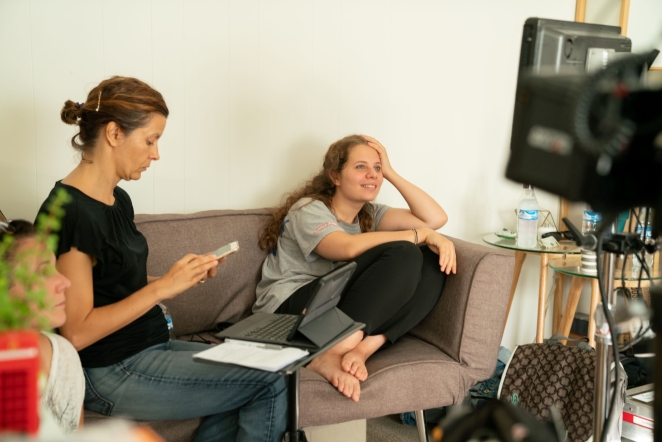
Keep up with industry trends and technological advancements. Creative fields are constantly evolving, so staying informed will help you remain competitive and adaptable.
In addition to your creative and technical skills, soft skills like communication, time management, and problem solving are essential in the creative industry. Cultivate these skills to enhance your employability.
If you’re open to freelancing or self-employment, learn about the business aspects of your field, including contracts, pricing, invoicing, and marketing. Building a client base and managing your finances are crucial for success in these paths.
Most importantly, be persistent and patient: remember that success in the creative industry often takes time and effort. Be proactive, continuously improve your skills, and stay dedicated to your craft. Building a creative career is a journey, and each step you take can bring you closer to your goals.
What tips would you give to other professionals to get more clients?
As a still green film director having to go through the struggle of short terms contracts, I am constantly trying to reach new clients. I find that the most essential thing is to be bold.
Don’t wait for your clients to learn about you from someone else. The word-of-mouth model is fragile. Actively pursue your clients. The worst thing you are risking is a refusal and if you are a filmmaker or aspiring one, you should be used to rejection by now.
For commercial clients, find them on social media, write to them. Find a number, call it. Keep it simple, put yourself in their shoes. Don’t talk too much. Quickly introduce yourself, show an interest, submit an example of your work and offer a meeting, call or quick chat.
Networking is not only restricted to potential clients. You should get the word out about what you do to everyone. You never know who might use your help and people can refer you to others as well.
What kind of tools/kit/software could you not do without?
Even though they are not technically “tools”, I always have a printed version of the script and the storyboard with me. It allows me to take notes but also enhance my creative vision. It is beneficial for other members of the crew and cast as well. It allows the DP to be efficient on set and, for the actors, it’s a way to understand the shot and tailors their performance.
A director view finder is very useful for framing shots and see how the shot would look like without having to change the whole set up.
As for softwares, I like to use Davinci Resolve for editing. It also has brilliant colour grading features. For scriptwriting, I like to use Final Draft and Scrivener even though the latter is a little less intuitive to use. The sun seeker app is very useful sun tracking tool to prepare for a specific shot.
What’s your secret to staying inspired and motivated?
It may sound like a light-hearted way of thinking, but living life to the fullest is the main driving force behind creativity. All too often, we find ourselves trapped in a routine that can easily be broken in small ways. Always being on the move, traveling, taking a walk outside or meeting new people is essential.
Making the most of every moment (even the simplest ones) like watching children playing, walking outside at sunrise or contemplating a beautiful tree are all things that can bring a sparkle to your writing. The most beautiful things in the world don’t need to be imagined, they exist around us.
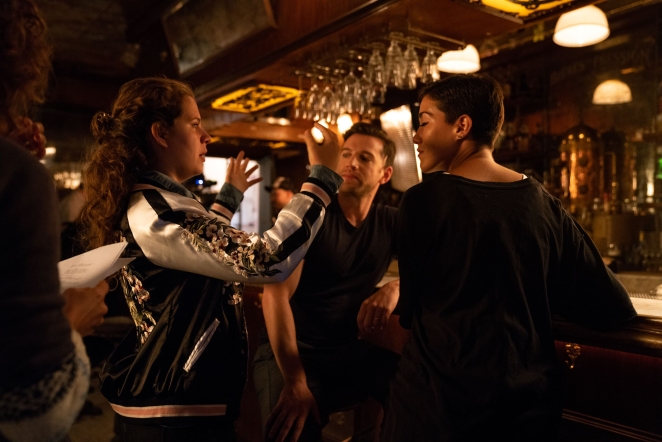
Motivation comes with passion. I love what I do and even when opportunities are scarcer, I don’t allow myself to be discouraged. I know that I am part of the lucky ones waking up with a smile when I get to go to work doing what I love most.
What’s the work achievement you’re most proud of?
In life, there’s only ever one first time, the one that leaves you with an unforgettable memory. I made my very first short film when I was 20 years old. I had never laid hands on a camera, never directed anybody in my life and didn’t know anything about filmmaking. A group of five friends and I gathered to make this short film happen.
We had no money whatsoever. The lack of budget forced us to be ingenious when it came to shooting. We even managed to do a dolly-zoom and a proper circular dolly shot without tracks. I learned so much on this shooting: I wrote the script, drew the storyboard, organized pre and post-production and directed the movie.
It was a very fun shoot as we truly relied on each other but mostly, it was extremely rewarding when we saw the final cut. Necessity is truly the mother of invention. I sometimes go back to watching it and I am still surprised at how thorough we were with the whole process and how creative it remains.
What is the one thing that you would change about the industry?
I would like less to change than to return to a certain conception of this profession in the past: an industry more open to novelty than to self-centeredness.
I’m not unaware that the industry faces many challenges these days. Technological changes and new broadcasting standards have yet to be fully digested, so has the disaffection of a public saturated with the images and stories flooding in via streaming platforms. Uncertain profits and skyrocketing costs have made decision-makers cautious, often pushing them to rely on old formulas.
However, an entertainment industry deprived of the oxygen of novelty can only bore and weary the public, who are ultimately our only judge. A platform like yours that enables young directors to confront their work with that of established ones is a step in the right direction.
However, there was a time when short films were seen as a breeding ground for talent that should be encouraged by fundings, and studios were open to scripts submitted by wannabe authors.
As a film director, I believe too many doors are still locked. Quality short films cost a lot of money to make especially because the director must invest a large portion out of pocket. Submitting a short film to festivals also costs money without any guarantee that either this or networking will lead to a job offer. There are job offers online for many jobs in the industry but there are rarely any for film directors.
I would love to see the day where film production studios will allow even for one day for film directors to come and pitch an idea. Ten minutes is all a well-prepared film director needs. There are so many bold and talented directors who decide to completely change career path because their first two short films weren’t noticed in festival, and they do not have the resources to risk making another one.
Any websites, books or resources you would recommend?
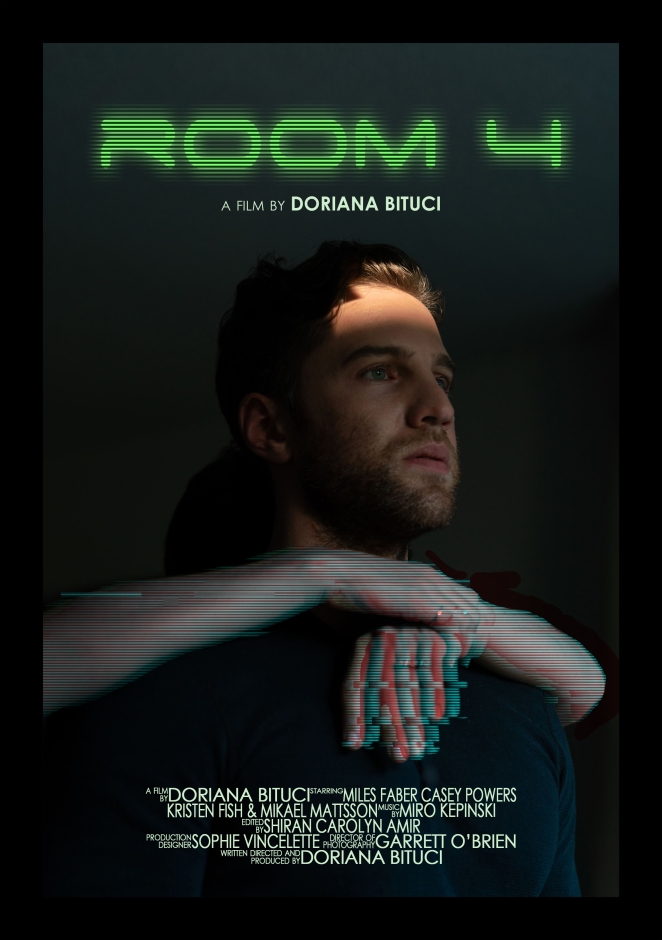
There are a few resources that help me be more efficient and structure my work.
Studio Binder is a great tool to manage project and organize production.
Stock images are very useful especially when you are beginning in filmmaking and don’t have the possibility to shoot everything (like famous places that require expensive shooting authorizations). I like to use Shutterstock and ProductionCrate.
Film-grab.com is a data base of high-quality movie stills that will help you built your pitch deck. Shotdeck.com is also a great resource.
For casting I like to use Casting Networks or Backstage.
When it comes to books, it is hard to pick just a few as they are many books about filmmaking that are worth reading. I often go back to “Making Movies” by Sydney Lumet, I find it very insightful. It gives you a deep understanding about directing and the process of filmmaking.
I would also recommend “Directing Actors” by Judith Weston– “Save the Cat” by Blake Snyder – “In the Blink of an Eye” by Walter Murch. “Poetics” by Aristotle is an essential read and will help you enhance your script writing skills and understanding of a story.
Finally, I can’t stress enough that behind-the-scenes of famous movies are an unvaluable source of information. The series “The Movies that Made Us” on Netflix shows that no movie is a walk in the park. There are always obstacles to overcome as a director and what truly makes a difference is how you decide to react when faced with a challenge.

